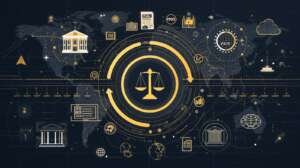The world of virtual assets is constantly evolving, and at the heart of its most profound innovation lies a revolutionary concept: the Decentralized Autonomous Organization, or DAO. Imagine a company that isn’t run by a CEO or a Board of Directors, but by a set of rules encoded in code, with every major decision voted on by its members. This is the promise of a DAO: it’s a global, digital co-op where power is distributed, rules are transparent, and community members have a direct say in its future.
Here in the UAE, a nation that has firmly established itself as a global hub for technological innovation, this idea is more than just a passing trend. With ambitious initiatives like the Dubai Metaverse Strategy and a forward-thinking regulatory body in VARA, the central question is no longer “what is a DAO?” but rather, “how can a DAO operate legally and compliantly within our sophisticated jurisdiction?”
The answer, as we’ll explore in this comprehensive guide, is both complex and incredibly promising. While a purely code-based DAO cannot just exist on its own, a new wave of legal frameworks is emerging in the UAE that is bridging the gap between decentralized governance and traditional corporate law. This article will take a deep dive into the legal challenges facing DAOs, the pioneering solutions being developed in places like Ras Al Khaimah and the Abu Dhabi Global Market, and the critical risks that every DAO member must understand to turn their digital dream into a compliant reality.
The Promise of DAOs and the UAE’s Digital Vision
A DAO, at its core, is a company run by a digital constitution. This “constitution” is a set of rules and logic written into a smart contract on a blockchain. The smart contract holds the organization’s treasury and automatically executes decisions once a vote passes. The power to vote is typically held by members who own the DAO’s governance tokens.
The allure of this model is:
- Total Transparency: Because all rules, votes, and transactions are recorded on a public blockchain, every action is open for the world to see, forever. This eliminates backroom deals and builds a level of trust that traditional companies can’t match.
- True Community Ownership: Members who own governance tokens feel a real sense of ownership. They are not just users; they are stakeholders with a voice, which can lead to a highly engaged and motivated community.
- Efficiency and Speed: Smart contracts can automate tasks that would normally require lawyers, accountants, or middle managers. This reduces friction, cost, and the time it takes to execute a decision.
The UAE, with its laser focus on attracting the best and brightest in the technology sector, is keenly aware of this potential. The nation’s strategic vision is to become a global leader in the digital economy, and providing legal clarity for these innovative decentralized models is a major step toward that goal.
The Core Problem: A Club Without an ID Card
Despite all its promise, an unincorporated DAO—a purely code-based entity—is fundamentally at odds with traditional corporate law. In the eyes of the law, it doesn’t exist. This creates a critical legal “black hole” that DAOs must navigate.
Under traditional law, an entity must have legal personhood to own assets, enter into contracts, or sue and be sued. It’s the legal equivalent of an ID card. A DAO, however, is not a legal person; it’s a collection of smart contracts and a group of individuals who may be pseudonymous and geographically dispersed. This leads to severe real-world limitations:
- Real-World Transactions: A DAO cannot, in its own name, lease office space, open a corporate bank account, hire employees, or enter into a legally binding contract with a vendor. The moment a DAO needs to interact with the traditional financial or legal system, it hits a roadblock.
- Asset Ownership: While a DAO can hold virtual assets in a multi-signature wallet, it cannot legally own a physical asset like a building, a yacht, or a piece of intellectual property.
The Threat of Unlimited Personal Liability
This is, without a doubt, the most significant risk facing DAO members today. Without a corporate structure that provides limited liability, a DAO and its members could be considered an unregistered general partnership. This could expose every single member to unlimited personal liability for the DAO’s debts, legal obligations, or any actions it takes that result in a lawsuit.
Imagine your DAO makes a mistake—perhaps a vote leads to a contract that a third party believes was breached, or an action by the DAO causes a loss. A court could rule that every member of the DAO is personally liable for the damages. This means your personal assets, your home, your savings—everything could be at risk. This is a powerful, sobering reality that the “code is law” principle cannot protect you from.
In the traditional legal system, if a dispute arises, you know who to sue: the company. There’s a clear chain of command and a legal representative you can serve with a lawsuit. With a DAO, this is not the case. A line of code cannot be sued in a courtroom. The absence of a clear legal hierarchy and the potential for anonymity make it incredibly difficult for a third party to seek legal recourse or enforce a contract. This legal uncertainty creates a barrier to trust and makes it difficult for DAOs to do business with traditional corporations.
The ‘Legal Wrapper’ in Detail
Recognizing these challenges, pioneering jurisdictions within the UAE are not just standing by; they are actively creating solutions. The concept is to provide a legal “wrapper”—a traditional legal structure that a DAO can sit inside of—to provide it with legal personhood and a liability shield, all while allowing the internal governance to remain decentralized and on-chain.
Here are the groundbreaking frameworks that are leading the way:
RAK DAO’s Pioneering DARe Framework
The Ras Al Khaimah Digital Assets Oasis (RAK DAO) is a major pioneer in this space. Its new DAO Associations Regime (DARe) provides DAOs with a formal legal status by allowing them to register as a Company Limited by Guarantee (CLG). This framework is a huge step forward because it:
- Grants Legal Recognition: DARe gives a DAO legal personhood, allowing it to own assets, enter into contracts, and take on obligations in its own name.
- Provides Limited Liability: By incorporating as a CLG, the framework provides limited liability for its members, protecting them from personal risk.
- Balances Governance and Law: The framework mandates a “Council” of at least two real people who can represent the DAO in off-chain activities, handle regulatory interactions, and ensure compliance with local laws. This clever solution bridges the gap between decentralized governance and the need for legal accountability.
- Recognizes Token Holders: The framework is explicitly designed to recognize token holders as members, giving them a voice in governance through on-chain voting.
ADGM’s DLT Foundation: A Global Template for DAO Legality
The Abu Dhabi Global Market (ADGM), a financial free zone with its own civil and commercial laws, has also created a unique and globally recognized framework. The ADGM’s Distributed Ledger Technology (DLT) Foundations Regulations created a new type of legal entity called a DLT Foundation.
- Purpose-Built for DAOs: The ADGM’s DLT Foundation is specifically designed for DAOs and blockchain projects. It provides a legal personality that can sue and be sued, hold assets, and issue tokens, all while its internal governance is dictated by token-holder voting and smart contracts.
- Flexible Governance: This framework is unique in that it allows for the absence of traditional bylaws, enabling DAOs to implement their own technology-enabled governance models.
- A Global Precedent: The ADGM’s framework has set a global standard for integrating decentralized governance into a traditional legal system, positioning the UAE as a leader in this critical area.
The Hybrid Model: Using a DIFC Foundation
While the Dubai International Financial Centre (DIFC) does not yet have a bespoke DAO framework, its existing legal structures offer a powerful and promising path forward. A DIFC Foundation is a separate legal entity without shareholders, often used for wealth management and philanthropic purposes. A DAO could theoretically be structured under a DIFC Foundation, where the Foundation’s charter would state that its governance is determined by its token holders and a set of smart contracts. The Foundation’s “Council” could be a multi-signature wallet controlled by key DAO members, providing a legal identity and limited liability for the DAO while preserving its decentralized governance.
Navigating the Real-World Risks
Even with a perfect legal “wrapper,” DAOs still face significant internal and external challenges that every member must understand.
- Smart Contract Risk: The “code is law” principle is powerful, but a bug in the code is like a legal loophole that can’t be fixed without a vote. A bug can be catastrophic and irreversible. The infamous 2016 DAO hack, which was a real-world warning of this risk, led to the loss of millions and a major hard fork of the Ethereum blockchain.
- Centralization Theater: A DAO may present itself as decentralized, but a small group of founders or key players can often hold the majority of the governance tokens, giving them disproportionate voting power. This can lead to decisions that serve a select few rather than the entire community, undermining the core promise of decentralization.
- Regulatory Uncertainty: While the UAE has created clear frameworks, a DAO’s native token could still be deemed an unregistered security by regulators in other jurisdictions if it’s traded globally. This creates a complex compliance challenge and a risk of enforcement action from regulators like the Securities and Commodities Authority (SCA) in the UAE.
- Operational Inefficiency: For a large, geographically dispersed, and often pseudonymous group of token holders to make complex business decisions in a timely and effective manner is a significant challenge. This can lead to decision-making gridlock, slow development, and an inability to respond quickly to market changes or security threats.
- Lack of Accountability: If a DAO-approved action leads to a negative outcome, the decentralized nature of the organization makes it incredibly difficult to assign accountability. The absence of a clear hierarchy and the potential for anonymous voting can make legal recourse and dispute resolution complex and time-consuming.
Hype or Reality? A Clear Path Forward
So, are DAOs in the UAE hype or a reality? The answer, today, is a resounding and promising reality.
While a purely code-based, unincorporated DAO remains largely in the realm of hype—primarily due to the insurmountable legal challenges of personhood, liability, and contractual enforcement—the UAE is actively bridging this gap. The pioneering frameworks from RAK DAO and the ADGM demonstrate a clear commitment to providing DAOs with a legal identity. These innovative models offer a powerful hybrid solution: a legal “wrapper” that provides limited liability, holds assets, and interfaces with the real world, while the internal governance remains decentralized and on-chain.
The UAE, with its dynamic regulatory environment and commitment to innovation, is on a path to becoming a global leader in providing legal clarity for decentralized organizations. For DAOs seeking a legitimate and secure base of operations, the UAE’s bespoke legal frameworks offer a powerful and promising path to transform their vision from code into a real, operational, and compliant entity. It is a testament to the nation’s vision of a future where groundbreaking technology is not just embraced but given a clear and secure home to flourish.




